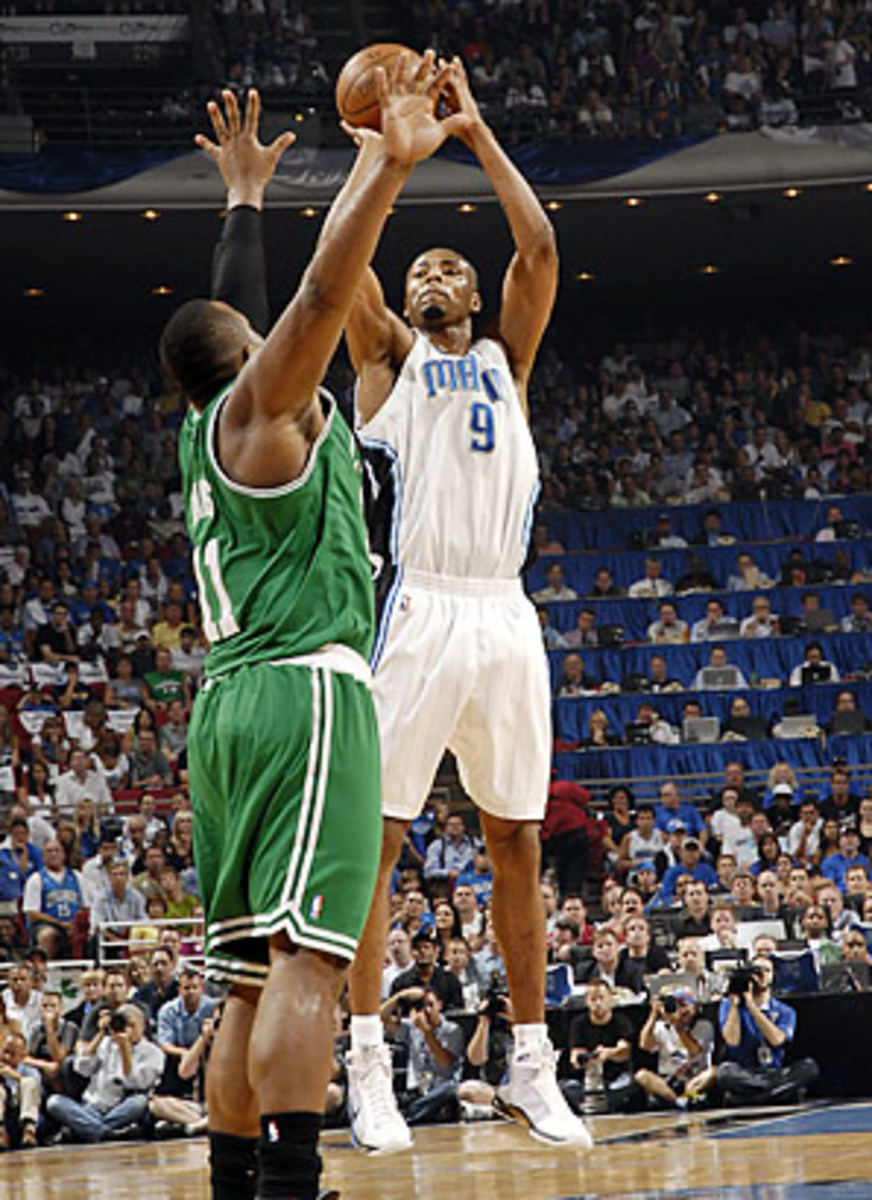Lewis flourishes in changing role
"It's turned out to be a lot better than I would have thought," Orlando's All-Star forward said of his long night in 1998 in the NBA draft green room, when he made the apparent mistake of turning pro as a senior from Alief Elsik High School in Houston. He wasn't chosen until No. 32 overall in the second round by the SuperSonics, who offered him a two-year contract.
"My feelings were hurt," Lewis said. "Maybe I'm not good enough to make the league? What am I going to do? I've got an agent, I can't go back to school."
Within the decade, however, the Magic were recruiting Lewis in '07 with a six-year, nine-figure deal that paid him $16.4 million this season, ranking him among the 20 most expensive players in basketball. The size of that contract came as another kind of surprise -- did Lewis belong in that elite category?
The early returns have been promising. Now 29, Lewis is within reach of the conference finals after helping Dwight Howard make the second round in each of their two seasons together with Orlando. After being voted to his second All-Star team by the Eastern coaches while averaging 17.7 points this season, Lewis has raised his play to average 20.0 points, 6.4 rebounds and 3.2 assists in these playoffs.
While his rebounding has been criticized -- 5.8 per game this season as a power forward -- his primary job is to space the floor around Howard. Lewis has a peculiar way of making big plays without drawing attention to himself.
"He's had a lot of his best games over the last two years when we've needed them most in the playoffs," Magic coach Stan Van Gundy said. "You go back to last year, Game 4 in Toronto, he had his huge game after they had won Game 3 ..."
Lewis had 27 points that day to seize a 3-1 lead in that opening-round series.
"And obviously," Van Gundy continued, "Game 6 in Philly with Dwight out ..."
That was a day Lewis went for 29 to clinch the first-round win last month despite Howard's suspension.
"And obviously the other night," Van Gundy said of Lewis' 28 points in the Game 3 win at home against the Celtics. "Rashard's great under pressure. There's not a guy in this league who's going to play great every night in the playoffs in big games. But overall he's a very competitive guy who's come up big for us on many, many occasions."
The 6-foot-10 Lewis developed into a long All-Star small forward during his nine years with Seattle, where he averaged more than 20 points over his final three seasons as a complement to guard Ray Allen. Then the Magic hired him to become a slim power forward alongside Howard, the Defensive Player of the Year who plays almost exclusively in the paint. Lewis' versatility and humility have made the relationship work.
"He's a good second-option guy for Dwight," Magic general manager Otis Smith said. "Because Dwight's young, he wants [the ball] all the time -- got to have it, let me touch it, got to feel it -- where Rashard is not that guy. He'll let Dwight feel it and touch it, but when the game's on the line, Rashard is not running from the ball. When we need him to be big, he's generally big."
During Lewis' early years, coaches in Seattle pushed him to pursue his versatility, to exploit mismatches by posting up smaller defenders in addition to beating big men from the three-point line (where he is a career 39.1 percent shooter). In Orlando, the equation grew more complicated because Howard takes up so much space down low, leaving Lewis little room to work in the post.
"I was a main post-up guy in Seattle, but now you've got Dwight Howard," Lewis said. "When I came here, I found if I would take 12 shots throughout the game, seven of those were three-pointers. I found myself just shooting a lot of threes instead of getting to the basket for the easy layup. When your jump shot's not falling, that's when you go to the post to get something going, but it's tough when you've got Dwight Howard down there. I had to buy into that role, but at the same time learn that if my shot's not falling, OK, I need to be aggressive and get to the basket, or get a quick post-up in transition before Dwight gets down the court. I've just been learning game by game."
His matchup has been crucial in the Eastern semifinal against the Celtics, who lack the defensive versatility of Kevin Garnett. Lewis has been piling up fouls from Glen Davis and Brian Scalabrine as the Boston coaches shout instructions and encouragement to their forwards.
"It's funny, when I was out on the court [before Game 1 in Boston] I was joking with [Celtics big-man coach Clifford Ray]," Lewis said. "He laughs every time he sees me, because he remembers me when I was back in that green room. I was like, Yeah, I was in the back of the bus, but I crawled my way to the front. It took a while, but I crawled my way up."
When Ray hasn't been laughing with Lewis, he has been shouting at his big men to help stop Lewis. That decision to turn pro was a good one.





